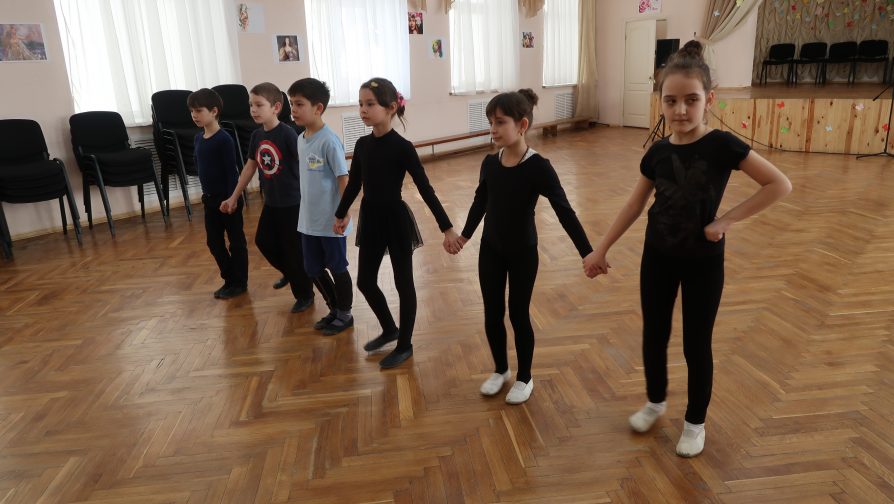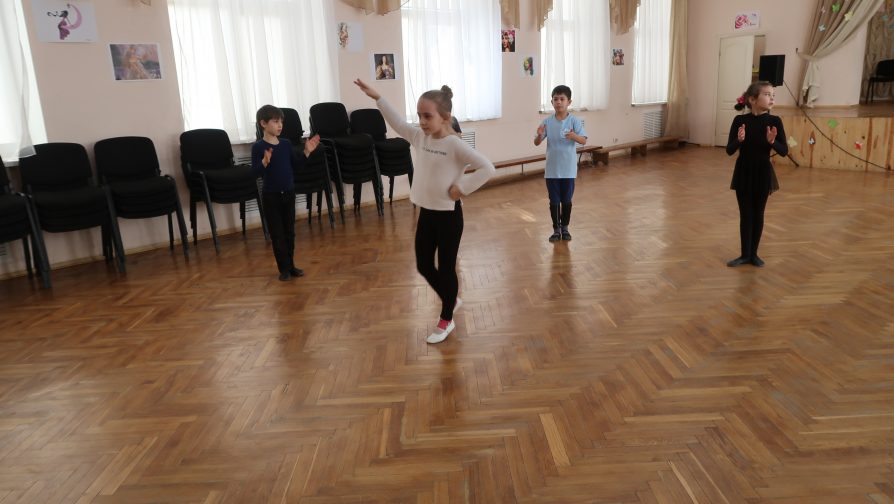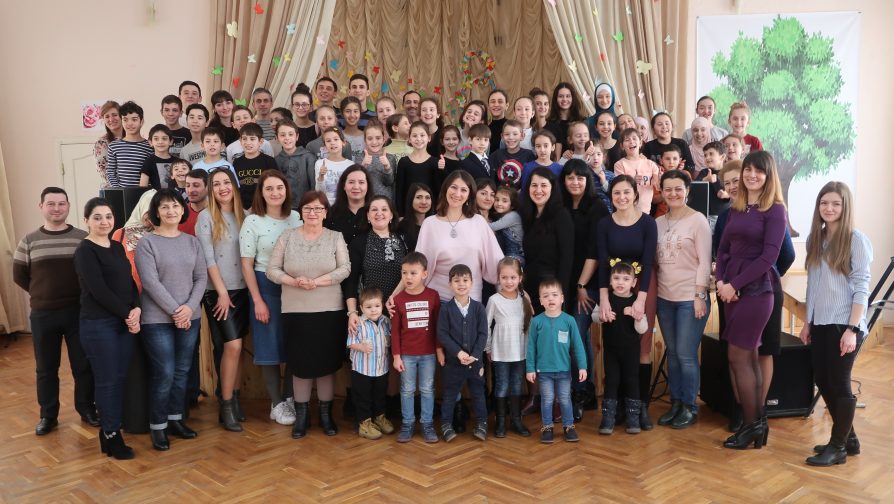Keeping tradition alive, in hopes to one day return home to Crimea
A map of Crimea is drawn on the blackboard as a teacher educates students on the history of this state. Children, 8 and 9 years old, carefully take notes as some raise their hands to ask questions. This school is a program run by the non-profit, Krymska Rodyna, and hosts lessons every Saturday on all Crimean Tatar traditions. From history lessons to dance lessons, classes are offered to youth starting as early as 4 years old to adults.
Five years ago this month Crimea was occupied by Russia, and conflict broke out in eastern Ukraine, causing 1.5 million persons to be displaced. Many, including Crimean Tatars, fled to major cities, such as Odesa, Lviv, and Kyiv, thus starting new lives.
Anife Kurtseitova, 37, has been an activist fighting for the rights of the Crimean Tatar community. A strong advocate, she has participated in numerous interviews, educating others about her culture, and hosted fundraising campaigns for Crimean children of political prisoners. She decided not to let tragedy determine the fate of her community.

Building an NGO organization after moving to Kyiv, she began a Saturday school program focusing on all things relating to the Tatar culture. While negotiating with the Department of Education , she managed to arrange the permission to use several premises on the basis of one school in Kyiv during the time free from classes.
Parents and all community of IDPs from Crimea hope that the city authorities will pay attention to the successful activities of NGO and will provide premises for the creation of a unique Crimean-Tatar center for children. Given the fact that over the last year the number of visitors to the center has doubled. Currently, there are 100 pupils and about 50 families, who would like to join the school because there are nothing similar in Kyiv.
The children are divided by age, covering specific categories; dance lessons, music lessons, history lessons, and even the Tatar language. Traditional Tatar embroidery classes are also offered for adults. The students also host public dance performances in traditional costumes.
Running up and down the stairs speaking to mothers who are helping her coordinate the classes, Anife quickly caters to each teacher’s needs. In the waiting room, parents laid out cakes and desserts as they laughed and shared stories about their children. Everyone knew everyone, and the parents were just as dedicated as Anife in keeping the program running.

“It is important for me to keep our traditions and languages alive. We are waiting when the Crimean occupation will be over and all these families will be able to come back home,” says Anife.
Though it is unknown when this day will come, Anife refuses to give up hope, finding creative ways to keep the spirit of her heritage alive. Her pride represents leadership, and with her guidance the Tatar community became a team. With their efforts, their culture will live on to future generations regardless of any difficulty.

Community-based approach a core to protection and transcends to UNHCR’s work with displaced population. UNHCR Ukraine protection strategy is built on strengthening community based protection mechanisms initiated by the IDPs and host community to identify and respond to protection needs and create coping mechanisms.
UNHCR Ukraine community based protection activities included regular dialogue and communication with IDPs through protection monitoring and Participatory Assessment and Support to small community initiatives. The project was aimed at enhancing capacity of the NGO consisted of initiative of Crimean Tatar IDPs to provide activities for Crimean Tatar children aimed at maintaining their ethnic identity and cultural traditions on the mainland of Ukraine. In 2015 and 2016 UNHCR provided technical assistance (microphones and audio system) and 10 stage outfits for children to the NGO for conduction of classes of Crimean Tatar music, vocal and dancing for the children.
Page 3 of 35
-

Despite progress in accessing education, hundreds of thousands of school-aged refugee children from Ukraine remain out of school
28 Jun 2024As the third disrupted school year for children and youth from Ukraine draws to a close, more than 600,000 remain out of school across the European Union, from an estimated 1.4 million school-aged refugee children from Ukraine in the block. This is despite some progress in terms of school enrolment, […]
-

UNHCR and Dnipropetrovsk Regional State Administration solidify ongoing collaboration to support displaced and other war-affected people
26 Jun 2024Dnipro, 26 June 2024: Today, UNHCR, the UN Refugee Agency, and the Dnipropetrovsk Regional State Administration signed a Memorandum of Understanding that sets out concrete areas of cooperation, aimed at supporting residents of the region who are impacted by the hostilities and internally displaced people who have been received in […]
-

UNHCR welcomes the extension of Temporary Protection for refugees from Ukraine
26 Jun 2024BRUSSELS – UNHCR, the UN Refugee Agency is encouraged by the EU’s continued demonstration of solidarity and responsibility towards refugees from Ukraine, following the Council’s decision to extend temporary protection for an additional year. “Today’s announcement is much welcome as it ensures greater certainty for refugees from Ukraine, granting them […]
-

UNHCR renovates collective site for displaced people in Dnipro, with six more facilities to be completed this year across Ukraine
25 Jun 2024Supporting the comprehensive refurbishment of temporary accommodation centres, UNHCR helps to create better conditions for IDPs living in collective sites, including many forced to evacuate from areas with heightened security risks.
-

30 years and still standing with the people in Ukraine: UNHCR opens photo exhibition on its work with and for the people in Ukraine
20 Jun 2024The UN Refugee Agency is launching a photo exhibition to highlight three decades of working with and for people affected by displacement and war.
-

UNHCR adjusts criteria for cash assistance to people impacted by the war in Ukraine
14 Jun 2024The programme of multi-purpose cash assistance from UNHCR, the UN Refugee Agency, in Ukraine has been in place since the beginning of the full-scale invasion in 2022. All this time, the programme tried to respond to the requests of vulnerable categories of internally displaced people (IDPs) and war-affected population. It […]
-

UNHCR warns against apathy and inaction amid spike in forced displacement
13 Jun 2024Overall numbers rise to 120 million by May 2024; conflicts from Sudan to Gaza and Myanmar are creating new displacement and urgently require resolution.
-

Russia’s invasion places a generation of Ukrainian children under severe strain
31 May 2024 -

UNHCR alarmed at growing humanitarian needs around Kharkiv, Ukraine
21 May 2024Geneva, 21 May 2024 UNHCR, the UN Refugee Agency, is extremely worried about the worsening humanitarian situation, and resulting spike in humanitarian needs and forced displacement owing to the new ground offensive by the Russian Federation Armed Forces in the northeastern Kharkiv region in Ukraine. At the same time, relentless […]
-

First multiservice space will provide “one-stop shop” support to forcibly displaced and other war-affected people in Kharkiv city
7 May 2024In a newly opened multiservice space, people affected by the war can receive a range of services from UNHCR, its NGO partner Right to Protection and the city authorities to help them address essential needs and feel welcomed in Kharkiv.
